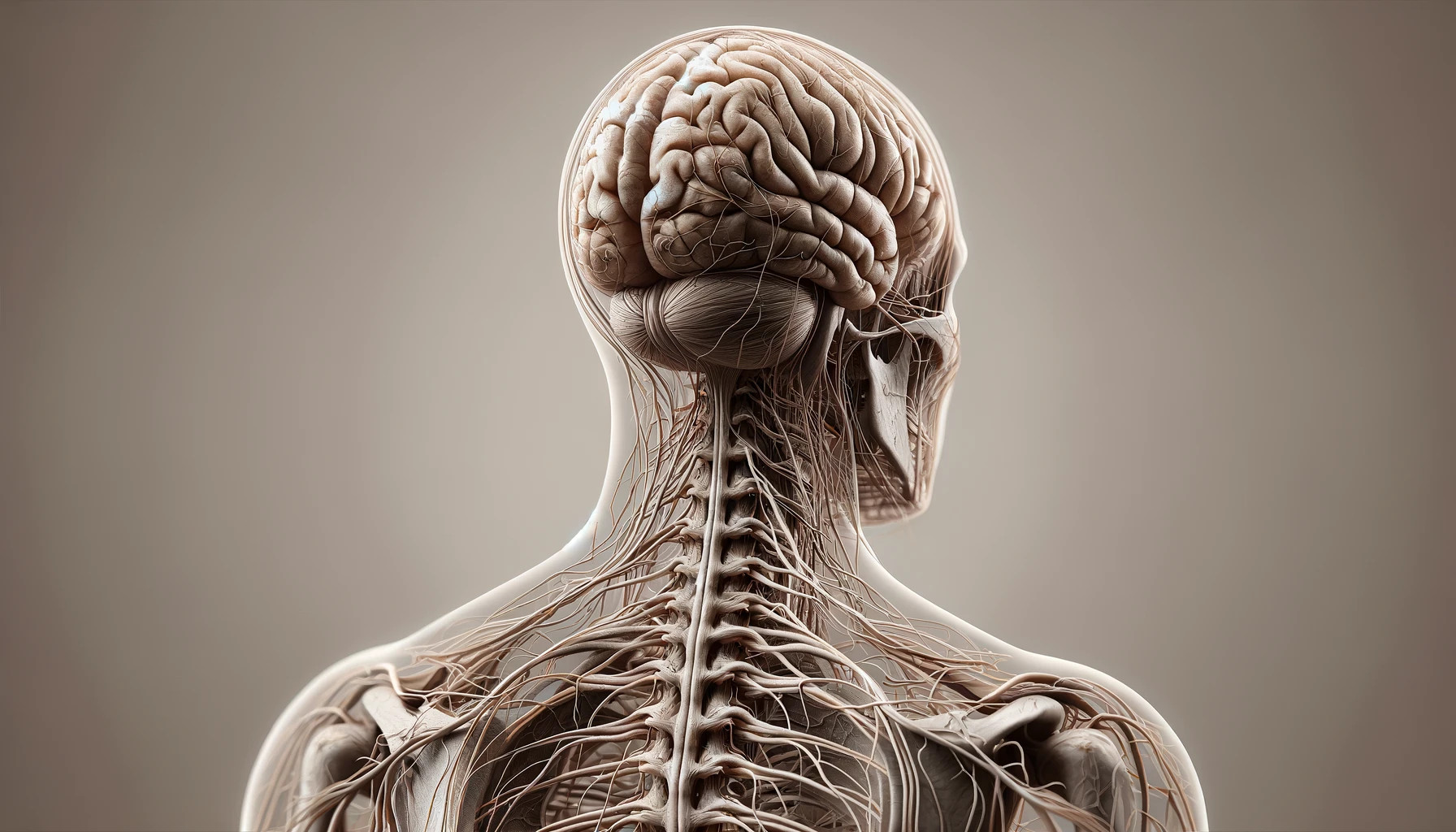The human nervous system is a highly complex and sophisticated system that coordinates and controls all the activities of the body. It’s essentially the body’s electrical wiring and can be divided into two main parts: the central nervous system (CNS) and the peripheral nervous system (PNS).
- Central Nervous System (CNS): The CNS is comprised of the brain and spinal cord. The brain is the control center of the nervous system and is responsible for processing sensory information, regulating body functions, and controlling thoughts, emotions, and memory. The spinal cord is a long, thin, tubular bundle of nerves and supporting cells that extends from the brain. It serves as a conduit for signals between the brain and the rest of the body.
- Peripheral Nervous System (PNS): The PNS consists of all the nerves that branch out from the brain and spinal cord to various parts of the body, including the limbs and organs. The PNS is further subdivided into:
- Somatic Nervous System: This system controls voluntary movements of the muscles and transmits sensory information to the CNS.
- Autonomic Nervous System: This system controls involuntary body functions, such as heart rate, digestion, and respiratory rate. It is further divided into the sympathetic (which prepares the body for action) and parasympathetic (which calms the body down) nervous systems.
The nervous system functions through the transmission of electrical and chemical signals. Neurons, or nerve cells, are the basic units of the nervous system. These cells communicate with each other through specialized connections called synapses. Neurotransmitters are chemicals that transmit signals across these synapses from one neuron to another.
The human nervous system is integral to everything we do – from the basic (like breathing and heart rate) to the complex (like thinking, dreaming, and feeling emotions).
How the nervous system affects the heart
The nervous system significantly affects the heart. The heart’s function is closely regulated by the autonomic nervous system, a part of the peripheral nervous system that controls involuntary bodily functions. The autonomic nervous system is divided into two main branches that have different effects on the heart:
- Sympathetic Nervous System: Often referred to as the “fight or flight” system, the sympathetic nervous system prepares the body for stressful or emergency situations. When activated, it increases the heart rate, raises blood pressure, and enhances blood flow to muscles. This response is mediated by the release of neurotransmitters like norepinephrine, which bind to receptors on the heart and cause these changes.
- Parasympathetic Nervous System: Known as the “rest and digest” system, the parasympathetic nervous system has the opposite effect on the heart compared to the sympathetic nervous system. It is primarily mediated by the vagus nerve, which releases the neurotransmitter acetylcholine. When the parasympathetic nervous system is activated, it decreases the heart rate and lowers blood pressure, promoting a state of relaxation and conservation of energy.
These two systems work in tandem to maintain a balanced heart rate and blood pressure, adapting to the body’s needs based on physical activity, stress, and other factors. For instance, during intense physical activity or stress, the sympathetic nervous system dominates, increasing heart rate and blood pressure to meet the body’s increased demand for oxygen and nutrients. In contrast, during periods of rest and relaxation, the parasympathetic nervous system prevails, slowing down the heart rate and reducing blood pressure.
The heart also has its own intrinsic pacemaker cells that can regulate the heartbeat. However, the nervous system plays a crucial role in modulating this intrinsic activity to suit the body’s varying needs.
Maintenance
Maintaining a healthy nervous system involves a combination of lifestyle choices and habits. First and foremost, a balanced diet rich in essential nutrients is crucial; foods high in omega-3 fatty acids (like nuts and oils), antioxidants (found in fruits and vegetables), and B vitamins (present in whole grains) support nerve health. Regular physical exercise not only improves blood flow to the brain but also stimulates the production of nerve-protecting compounds. Adequate sleep is essential for the nervous system to repair itself and consolidate memories. Stress management is another key factor; practices like mindfulness, meditation, or yoga can help reduce the harmful effects of chronic stress on the nervous system. Avoiding neurotoxins like excessive alcohol, smoking, and drugs is also vital. Keeping the mind active through learning, problem-solving, and engaging in social activities can help maintain cognitive function. Additionally, staying hydrated and minimizing exposure to environmental toxins where possible can also contribute to a healthier nervous system. Overall, a holistic approach that incorporates a healthy diet, physical activity, mental stimulation, and stress reduction can optimize the health and functionality of the nervous system.
In conclusion
The human nervous system is a marvel of biological engineering, playing a pivotal role in almost every aspect of our existence. From governing our thoughts, emotions, and memories to managing our physical movements and regulating vital functions like breathing and heart rate, its influence is all-encompassing. Maintaining its health is not just about preserving these functions; it’s about ensuring the quality of life and longevity. A well-maintained nervous system can lead to better cognitive abilities, emotional well-being, and resilience against neurological disorders. Through balanced nutrition, regular physical activity, adequate rest, stress management, and avoidance of harmful substances, we can support this intricate system’s optimal functioning. In essence, nurturing the health of our nervous system is synonymous with nurturing our overall well-being, enabling us to lead fuller, more active lives. The steps we take today to care for our nervous system can pay dividends in our health and happiness for years to come.
